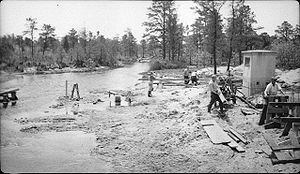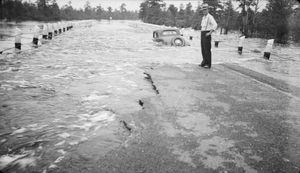
Harrisville, New Jersey
Encyclopedia


Bass River Township, New Jersey
-Demographics:As of the census of 2000, there were 1,510 people, 548 households, and 409 families residing in the township. The population density was 19.9 people per square mile . There were 602 housing units at an average density of 7.9 per square mile...
, New Jersey
New Jersey
New Jersey is a state in the Northeastern and Middle Atlantic regions of the United States. , its population was 8,791,894. It is bordered on the north and east by the state of New York, on the southeast and south by the Atlantic Ocean, on the west by Pennsylvania and on the southwest by Delaware...
, United States
United States
The United States of America is a federal constitutional republic comprising fifty states and a federal district...
, located about six miles northwest of New Gretna
New Gretna, New Jersey
New Gretna is an unincorporated area within Bass River Township in Burlington County, New Jersey, United States. The area is served as United States Postal Service ZIP Code 08224....
in the New Jersey Pine Barrens
Pine Barrens (New Jersey)
The Pine Barrens, also known as the Pinelands, is a heavily forested area of coastal plain stretching across southern New Jersey. The name "pine barrens" refers to the area's sandy, acidic, nutrient-poor soil, to which the crops originally imported by European settlers didn't take well...
. It is best known for producing paper under the Harris family's ownership. It was abandoned and then burned down in 1914 leaving only ruins. It is a part of the history of the Pine Barrens and New Jersey. Only the decayed ruins of this town exist today.
The Beginnings
1795 - Isaac Potts (ironmaster of Philadelphia) built the Wading River Forge and Slitting Mill.1796 - George and William Ashbridge of Philadelphia and Joseph Walker of Burlington County purchased the mill and forge.
1802 - John Youle from New York City bought William Ashbridge's share of the plant and worked with Joseph Walker.
1813 - Joseph Walker passes away and John Youle continues operations with his son, John Youle Jr
John Youle Jr. eventually took over ownership. The Iron industry in south Jersey experienced hard times during this time period due to discoveries and availability of resources in Pennsylvania.
1821 - John Youle Jr. sold the company to Samuel Richards, who shortly thereafter sold it to Samuel Read
Paper Production
1832 - The property was sold to William McCarty, Thomas Davies, and Isaac Ashmeade.William McCarty and Thomas Davies were booksellers from philadelphia. They decided to make paper at this location in the Pine Barrens. After some changes were made, paper production began. The area soon became known as McCartyville. At first they were just producing wrapping paper. After their initial success with the wrapping paper, they started making binder boards and bonnet boards also.
1841 - After experiencing some financial trouble, another mortgage was taken out.
1846 - The company could not afford to make payments and the property was foreclosed upon.
8 months passed with no production and then a fire destroyed the town.
The Revival
1851 - Richard Harris (a former employee at the paper mill under McCarty) and his brother William Harris decided to buy the property. It was difficult to obtain the property since ownership was scattered.1856 - Paperwork was finally sorted out and Richard and William Harris were the owners of the papermill and property. Their father, John Harris, and younger brother, Benjamin Harris, all worked to get the mill running.
Before long, John and Richard(father and son) were the sole owners and ran the paper mill at the recently renamed Harrisville. With the success of the mill, a small town grew. Besides the mill there were houses for the workers and their families, a school, a general store, a gristmill, the Howard Harris and Benjamin Harris mansions, the McCarty mansion, a saw mill, and a boarding house.
1856-1862 - There was a registered US post office in Harrisville to handle the mail of the inhabitants.
1866 - John Harris left Harrisville and retired.
Harrisville paper mill had a board of directors controlling it including Howard Harris (youngest brother of Richard Harris)
Harrisville was successful and had stores in Philadelphia and New York City to market their paper. Paper was sold nationwide.
At the peak of the town, the population was approximately 75 people.
1890 - The company defaulted on a loan and Harrisville went up for auction.
The Last Days
1896 - After some handchanging of parts of the property, Joseph WhartonJoseph Wharton
Joseph Wharton was a prominent Philadelphia merchant, industrialist and philanthropist, who was involved in mining, manufacturing and education...
became the owner. Wharton wanted to export drinking water to Philadelphia. Repairs were made to the buildings that needed it. He was not allowed to export water out of the state, so he worked on some agricultural research at Harrisville.
1909 - Wharton died and YMCA starts Camp Lyon at Harrisville which was their boys camp.
1914 - Harrisville burns down in a fire and is left for ruin.

